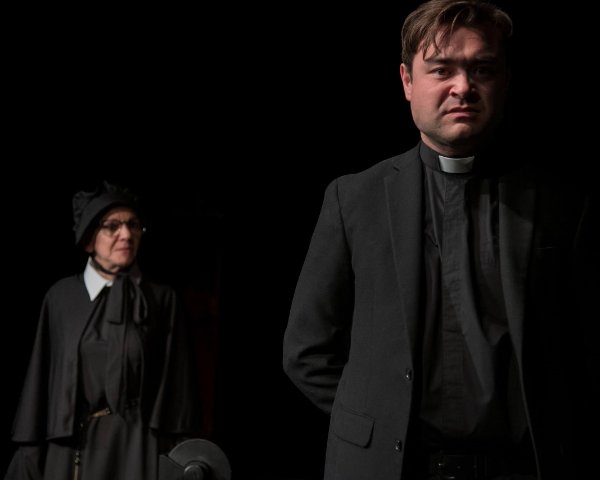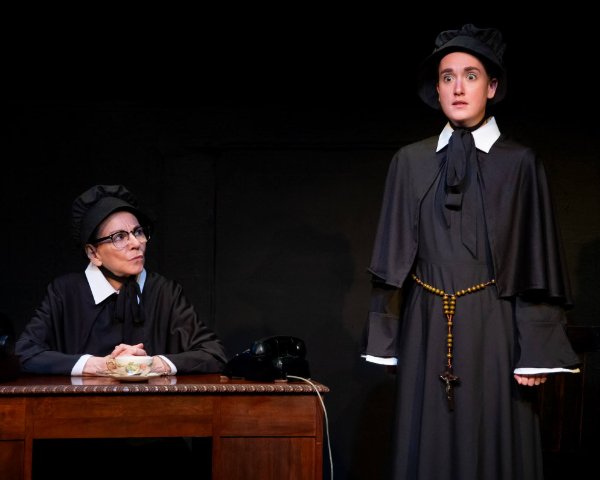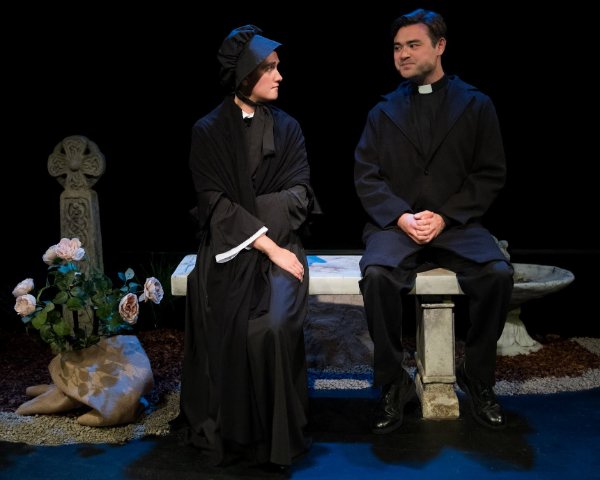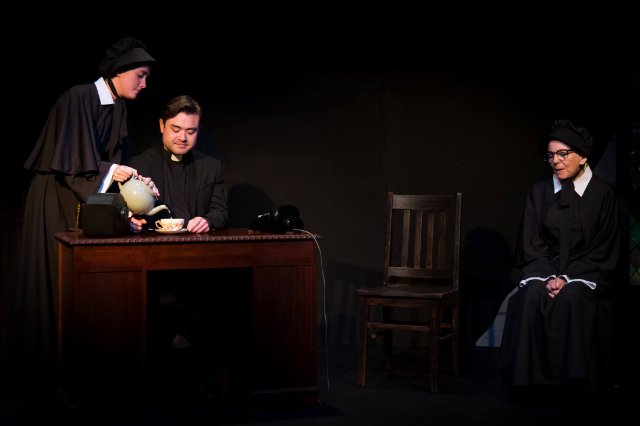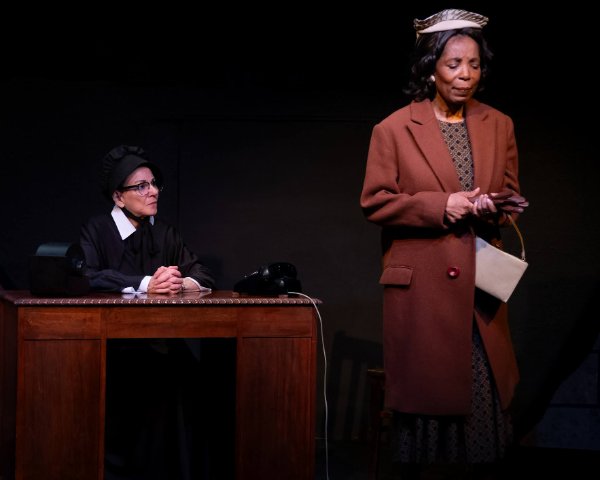Doubt, a Parable at Altarena Playhouse
A Chilling Allegory of Injury Caused by Faith
By: Victor Cordell - Jun 02, 2024
John Patrick Shanley’s 2004 stage play “Doubt, a Parable” won the Pulitzer Prize for Drama and the Tony Award for Best Play. This is quite an accomplishment for a claustrophobic, cloistered story with only four characters that takes place in a convent middle school – mostly in the office of its principal. The movie adaptation won several Oscar nominations. Altarena Playhouse offers an off-the-charts gripping revival of this absorbing drama, driven by an outstanding ensemble of four actors.
At its heart, the play is a character study of Sister Aloysius, the school’s principal. A rules-dominated, my-way-or-the-highway authoritarian, she maintains the unproven belief that young Father Flynn is a sexual abuser. Her belief is supported by the facts that the Father has long nails for a man; that he has been assigned to his third parish with somewhat short tenure in the previous two; and that he touched a boy on the hand.
Driven by these facts and her compulsive personality, she is convinced that Flynn is evil. An incident involving the unauthorized drinking of the sacramental wine by a new student that Aloysius attributes to Flynn’s involvement provides a trigger. The fact that the perpetrator is the only black boy in the school adds another layer of complication.
Altarena’s Artistic Director Katina Psihos Lethuele steps back onto the stage and into the role of Sister Aloysius with absolutely spectacular results. With pursed lips and lacking makeup, she appears older and dour. Donning a black bonnet and fuddy-duddy spectacles, and walking with an uneven gate add to the effect. The finishing touch is the brusque affect of clipped speech with condescending look and tone. Letheule transforms into the perfect representation of an unwavering, impregnable militant for whatever her chosen cause.
Believing that she has the students’ safety at heart, Sister Aloysius demands that the nuns maintain a watchful eye for any discrepant behavior at the school and to report it to her. Certain in her righteousness and driven by a need for power and control, she will break the same rules that she would denounce others for bending.
She coopts young and naïve Sister James as a confederate to try to out Father Flynn. It is the younger nun who reluctantly reports the wine drinking incident. Anna Kosiarek plays Sister James, and while the part is not nearly as juicy as Aloysius’s, she conveys the young nun’s conflictedness with great skill. Although Sister James’s faith seems unshaken, Kosiarek shows a wide-eyed innocence and a great range of emotions in response to Aloysius’s rigidity in summarily rejecting a wide array of human engagement from friendliness toward students to secular Christmas songs.
Meanwhile, Father Flynn is in a quandary. Though a priest outranks a nun, the vindictiveness of the principal and her willingness to expose him, even without evidence, puts him in a helpless situation. His turmoil is reflected in his homilies in masses, which deal with intolerance and gossip. Thomas Hutchinson adeptly captures the priest’s love of his work, care for children, and his anxiety when confronted with the charges. More importantly, Hutchinson delicately balances his interactions with Sister Aloysius with such trepidation and ambiguity as to beg the question of guilt in the minds of the audience.
A final star turn is by Billie J. Simmons as Mrs. Muller, the mother of Donald, who had drunk the wine inappropriately. Called into Sister Aloysius’s office for a conference, Simmons nails the characterization of one who may be working class in education and verbal expression, but who has the intelligence and insights to ascertain that the principal is more interested in advancing her own agenda than in protecting the parent’s son. Simmons also exhibits the uncommon courage of a parent not being intimidated by the principal despite having little leverage.
As suggested by the extension of the title, the play is not simply an examination of a person obsessed about someone’s presumed deficient character. “Doubt” stands as a broad indictment of organized religion. All religions build upon some facts, but at their core, adherents hold to a shared body of intangible, unprovable beliefs, often in conflict with the precepts of other religions. On its own, subscribing to a set of beliefs is not pernicious, but inevitably, beliefs often cleave populations tribally between devotees and outsiders. Just as inevitably, dogmatic holding to these beliefs as truths can act as a battering ram, vilifying and harming people outside the circle.
Moreover, the playwright exposes the darker side of clerics. Virtually none of the issues in the play concern clash of religious precepts, but many concern the exercise of power. This is evidenced by Sister Aloysius’s administrative and pedagogical philosophies, which she foists on Sister James and others unseen. And while the principal may actually believe that Father Flynn has abused students, she is unwilling to go through channels or wait to prove that something illicit has occurred. Rather, she wishes to muscle him into submission, based on her beliefs unsupported by proof.
Another blemish that can be imputed is that for all of its veneer of religious observance, organized churches constitute an industry. They compete for success and survival. Their managers come and go. Perhaps more damning is the notion of clerics as professionals, who even with the loss of faith continue their careers for any number of dubious rationales. Many have feet of clay and perhaps should never have taken the collar or the habit to begin with.
“Doubt, a Parable” captivates from its opening sermon about how shared doubt can act as a strong bond, leading relentlessly to its crash ending. Director Shannon Nicholson has engaged a superb cast whose performances make for a superior, if somewhat chilling, theatrical experience.
“Doubt, a Parable” is written by John Patrick Shanley, is produced by Altarena Playhouse and plays on its stage at 1409 High Street, Alameda, CA through June 30, 2024.

